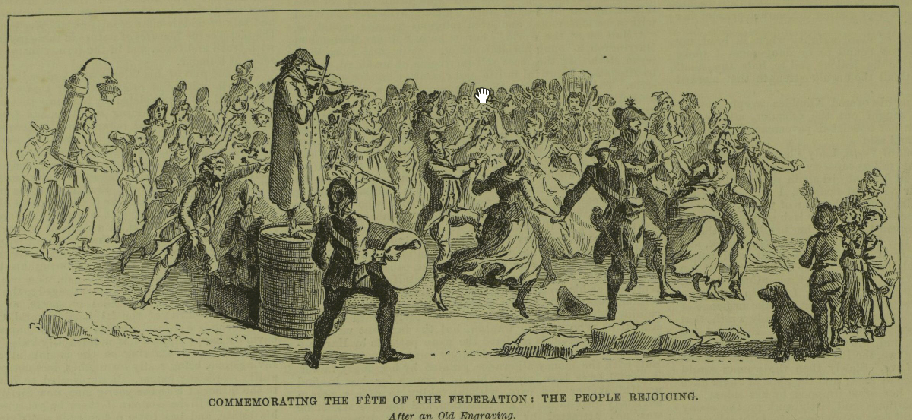14th July is the day of “fête nationale” in France, or “Bastille Day” as it is known in English, falling on the anniversary of the storming of the Bastille prison on 14th July 1789, in the early days of the French Revolution. It is a day of popular celebrations, grand military parade and lavish fireworks. Contrary to the 4th of July, the American Independence Day celebrating events of 1776, the 14th July was slow to establish itself firmly as a date of national celebrations in France. The chequered history of this holiday can been traced in Gale’s rich newspapers archives.
The first celebration did take place on the first anniversary of the events on 14th July 1790, as the “Fête de la Fédération”. Violent events had passed and it was time for celebrating unity, with the fete bringing together, Monarchy, Clergy and People in a grandiose ceremony. The mood was one of optimism and enthusiasm as described in this article from the Illustrated London News.
!["Paris in 1790." Illustrated London News [London, England] 26 July 1890: 110. The Illustrated London News Historical Archive, 1842-2003. Web. 9 May 2016.](http://blog.gale.cengage.co.uk/wp-content/uploads/2016/07/federation.png)

!["London and Paris a Hundred Years Ago, Paris in 1790." Illustrated London News [London, England] 26 July 1890: 108+. The Illustrated London News Historical Archive, 1842-2003. Web. 9 May 2016.](http://blog.gale.cengage.co.uk/wp-content/uploads/2016/07/federation_fete.png)
“The royalist is not free to say prayers for the soul of a dead royalist for fear of a mob – the republicans are not to commemorate their revolutionary festivals and events, for fear of exciting republican notions – the Napoleonist is not allowed to have even a variety of guns and swords, matters of mere antiquity, at his house, lest it should become a depôt of arms…”
Naturally, 14th July celebrations were not welcome that year as the same article continues:

It is not until the 3rd Republic that the republic will durably establish itself as the political system of the French nation and the 14th of July return to the limelight. Soon after his nomination as President of the Chamber of Deputies in 1879, Léon Gambetta organised the first modern official celebration of this date. The significance of this event was not missed in this Daily Telegraph report dated 15 July 1879

Other celebrations took place on that day in addition to this political event, demonstrating popular support and the return to a joyous mood.

A year later, in 1880, the National Assembly passed a law making the 14th of July a national holiday. The enthusiasm surrounding the 1880 celebrations transpires both through the number of press articles covering the event and the effusive descriptions of it. The Telegraph Historical Archive alone reveals no less than 7 articles on the “French National Fête” between 8thand 17th July.
Descriptions of the events that took place that day are vivid:
!["French National Fête." Daily Telegraph 14 July 1880: [5]. The Telegraph Historical Archive. Web. 10 May 2016.](http://blog.gale.cengage.co.uk/wp-content/uploads/2016/07/1880_2.png)

This event started the long series of celebrations of “fête nationale” that continues today.


